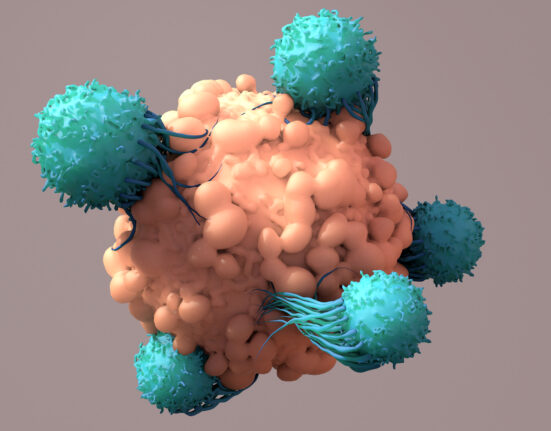Orca-T, an investigational allogeneic T-cell immunotherapy, led to better outcomes than standard treatment for patients with blood cancers receiving myeloablative transplants from matched donors by reducing chronic graft-versus-host disease (GVHD) and improving survival compared to conventional allograft with tacrolimus/methotrexate, according to the phase 3 Precision-T study.
The results were reported in an oral abstract presented by Everett Meyer, MD, of Stanford University School of Medicine in California, at the 51st Annual Meeting of the EBMT, held in Florence, Italy.
Orca-T is an allogeneic stem cell and T-cell immunotherapy that leverages high-purity regulatory T cells to prevent GVHD. It is individually manufactured for each transplant recipient, using cells collected from the mobilized peripheral blood of a single donor.
The phase 3 component of the Precision-T study is a randomized, open-label, multicenter study comparing outcomes between patients comparing Orca-T to a conventional allograft with tacrolimus/methotrexate.
In the study, eligible adults undergoing myeloablative allogeneic Hematopoietic stem-cell transplantation (HSCT) for acute leukemia in complete remission, with intermediate- or high-disease risk index, or high-risk myelodysplastic syndrome (MDS) with ≤10% BM blasts, and human leukocyte antigens (HLA)-matched donors were randomized 1:1 to receive either Orca-T with single-agent tacrolimus or unmanipulated peripheral blood stem cells plus tacrolimus/methotrexate.
The primary diseases included acute leukemia (53% myeloid, 30% lymphoblastic and 3% mixed phenotype) and high-risk MDS (14%), the authors reported.
Orca-T was manufactured in a centralized good manufacturing practice (GMP) facility, distributed, and infused successfully in 88 patients at 19 centers across the U.S.
The results showed that Orca-T had a significantly higher survival free of moderate-to-severe chronic GVHD compared to tacrolimus/methotrexate (HR, 0.26; 95% CI, 0.14–0.47, P<0.00001). In the intent-to-treat population, the one-year rates of survival free of moderate-to-severe chronic GVHD were 78% (95% CI, 65%–87%) for Orca-T and 38% (95% CI, 26%–51%) for the tacrolimus/methotrexate arm. Cumulative incidence of moderate-to-severe chronic GVHD at one year was 13% (95% CI, 5%–23%) for Orca-T and 44% (95% CI, 31%–56%) for tacrolimus/methotrexate (P<0.0003).
“Results suggest Orca-T may be considered as a new standard of care for patients with hematologic malignancies and HLA-matched donors following myeloablative conditioning,” Dr. Meyer and colleagues concluded.
Funding was provided by Orca Bio.
Reference
Meyer E, Salhotra A, Gandhi A. OS15-01 ORCA-T® demonstrates improved survival free of chronic GVHD compared to conventional allogeneic hematopoietic stem cell transplant: a randomized phase 3 trial in advanced hematologic malignancies. Abstract EBMT 51st Annual Meeting. March 30-April 2, 2025; Florence, Italy.


